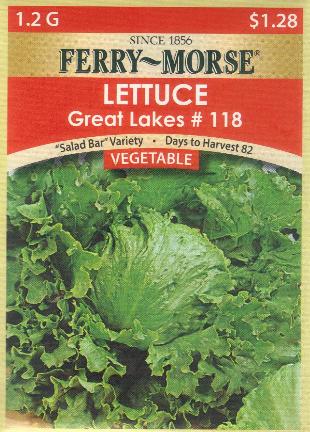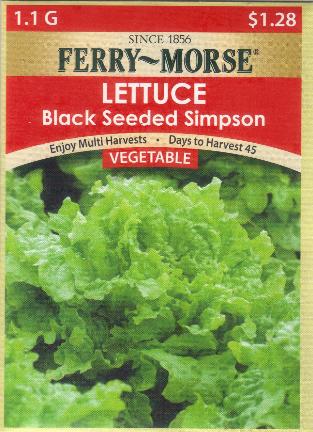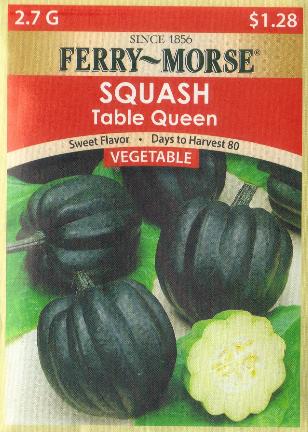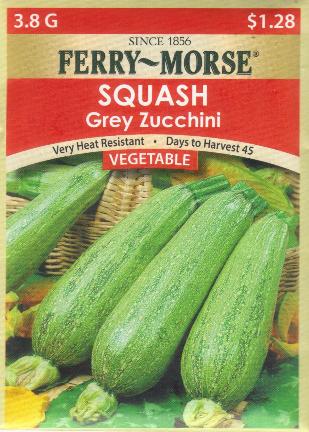
















How to Select Vegetable Seeds
for a Hard Times Garden
Copyright © February 2, 2015 by Robert Wayne Atkins, P.E.
All Rights Reserved.
Introduction
When you look at the seed packages in a seed display rack you will usually notice that there are many different varieties of seeds for one type of vegetable.
If you are not familiar with the varieties that you have to select from then may I suggest that you consider the following factors:


- Heirloom Seeds: Look for seed packages that do not have the word "hybrid" on the front of the package. If the word "hybrid" is not on the front of the package then the seeds will probably be heirloom or open pollinated seeds. However, the words "heirloom" or "open pollinated" may or may not be printed on the package. If you read the information on the back of the package then you will sometimes find the word "heirloom."
- Days to Harvest: Look at the "Days to Harvest" information on the front or the back of the package. For example, if you look at lettuce (or squash) you will discover that there can be between 5 days to 37 days difference in how long you have to wait before you can harvest and eat the lettuce (or squash) shown on the front of the seed package. I strongly suggest that you select seed varieties that can be grown and harvested in the shortest period of time for the following reasons:
- Hunger: During hard times your family may be very hungry and your family will not appreciate having to wait an additional 5 days (or a lot longer) before the vegetables are big enough and ripe enough to eat.
- Wild Animals and Birds: Some wild animals and some birds will eat the vegetables in your garden. You can minimize the loss of your vegetables to these types of wild life if you can harvest your vegetables sooner instead of later.
- Insects: It takes time for insects to breed and to multiply and to do some serious damage in your vegetable garden. If you can harvest your vegetables sooner then this gives the insects less time to attack and destroy your crops.
- Disease: Diseases are similar to insect pests. They take time to spread across your garden area. If you can harvest your vegetables sooner then this gives the disease less time to spread and infect your entire vegetable crop.
- Theft: During hard times more and more people gradually decide that it is okay to steal vegetables from their neighbor's gardens. The sooner you can harvest your vegetables then the less time your vegetables will be in your garden waiting to being stolen.
- Bad Weather: The longer your vegetables are in the ground then the more days they will be exposed to the chance of one really bad weather day. Sleet (or hail), or a really heavy rain, or an early frost can destroy your entire vegetable garden. If you can minimize the amount of time your vegetables will be exposed to the weather then you can increase your chance of enjoying a good harvest and you can minimize your chance of a complete loss of your crops because of one really bad weather day.
- Drought: Rain is not always predictable. There may be periods of good rain followed by long periods of very little or no rain. If your vegetables will mature quicker then you will minimize the risk of losing your vegetables to an extended period of time when there is very little or no rain.
- Replanting: Depending on the number of days until harvest, and the total number of days in the growing season where you live, you may be able to plant a second crop of vegetables in the same exact space as the first crop of vegetables that you just harvested. In some areas, you may even be able to plant a third crop after you harvest your second crop. If this is possible in your area then please remember to practice crop rotation.
However, there are valid reasons why some people prefer varieties that take longer to grow, such as:
- Flavor: Some people prefer the taste of a specific variety of vegetable even though it takes longer for it to mature.
- Size: Longer growing times sometimes result in larger vegetables. Some people measure their gardening success based on the size of the vegetables they grow.
- Resistance: Some seed varieties are more resistant to specific types of insects and diseases that impact a geographical area, and gardeners pick these varieties for this reason.
- Use: Vegetables may be eaten fresh, or they may be dried, canned, or frozen. Some vegetables are grown because they are better for canning or freezing than they are for immediate consumption.
Harvesting Before Maturity

 Generally it is not practical to harvest most vegetables before they are mature for the following reasons:
Generally it is not practical to harvest most vegetables before they are mature for the following reasons:
- Flavor: The natural flavor of most vegetables does not fully develop until they are mature.
- Texture: The texture or consistency of a vegetable gradually improves as it matures.
- Moisture Content: As a vegetable matures it gradually stores more moisture inside the edible part of the vegetable.
- Sugar Content: Young immature vegetables may have a tart or unpleasant taste. However, as the vegetable matures its gradually acquires the pleasant taste you are accustomed to.
- Nutrients: As vegetables mature they gradually store more nutrients inside the edible part of the vegetable. The nutrients in the vegetable are what keeps us alive and healthy, and nutrients are the primary reason we grow and eat vegetables.
Conclusion
Selecting a specific type of vegetable seed that does well in your geographical area, and that is suitable for your intended use (eating fresh, or canning, or freezing), is not an easy decision.
I recommend seeds with the least number of Days to Harvest, except when a variety has special qualities, such as it stores well during winter. The reason is because during a serious hard times event a quick harvest will be more important than some of the factors that may be important during normal times.
If you can afford it, then one strategy that you may wish to consider is to purchase more than one variety of seed in each vegetable category. For example, you could pick a variety that has the minimum number of days until harvest, and you could also pick another variety of that same type of vegetable based on its flavor, or its disease resistance, or its use (canning or freezing), or how long it remains edible while it is in storage in a cool area during the winter months.
Please remember that if you store your vegetable seed packages in a heavy-duty zipper freezer bag inside the lower compartment of your refrigerator, then there is a good chance those seeds will still be healthy and have the ability to germinate even after five, ten, or more years have passed. In you are interested in some research I did to support this claim then please click here.
Respectfully,
Grandpappy.
Grandpappy's e-mail address is: RobertWayneAtkins@hotmail.com







































 Generally it is not practical to harvest most vegetables before they are mature for the following reasons:
Generally it is not practical to harvest most vegetables before they are mature for the following reasons:
